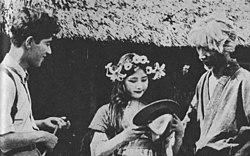Harumi Hanayagi
Japanese film and stage actress From Wikipedia, the free encyclopedia
Harumi Hanayagi (花柳 はるみ, Hanayagi Harumi, 24 February 1896 – 11 October 1962) was a pioneering Japanese film and stage actress.
Harumi Hanayagi | |
|---|---|
花柳はるみ | |
 Hanayagi in Maid of the Deep Mountains (1918) | |
| Born | February 24, 1896 |
| Died | October 11, 1962 (aged 66) |
| Occupation | Actor |
| Years active | 1915–1928 |
Career
In 1915, Hanayagi became a student at the Geijutsuza, the modern theater troupe led by Hōgetsu Shimamura and Sumako Matsui, and made her stage debut.[1] She moved to the Tōjisha troupe in 1917 and appeared with them in a series of films directed by Norimasa Kaeriyama for Tenkatsu, starting with The Glow of Life (released 1919).[1] In an era where female roles on screen were played by male actors (onnagata), Hanayagi was considered "the first billed appearance of a female performer" in Japanese cinema,[2] even though actresses such as Nakamura Kasen had appeared in earlier films or in rensageki, a combination of film and live stage performance.[3][4] After appearing in more films, she focused her career on the stage after 1920, eventually appearing in the Tsukiji Little Theater as well as the proletarian theater of Tomoyoshi Murayama.[1] She retired in 1928 after getting married.[1]
Selected filmography
- The Glow of Life (1919)
- The Maid of the Deep Mountains (1919)
References
External links
Wikiwand - on
Seamless Wikipedia browsing. On steroids.
